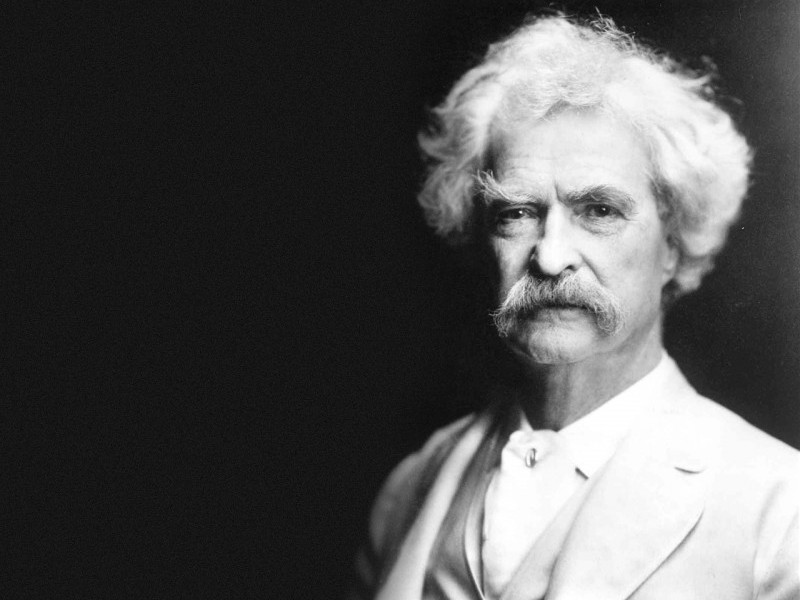WHO WAS MARK TWAIN?
All of us are quite familiar with the famous books Adventures of Tom Sawyer and Adventures of Huckleberry Finn.
Remember those elementary days when we read and discussed these depictions of mischievous boys growing up under an illusion that society with all its rules and expectations was to be avoided and being free of society’s rules was the greatest way to live?
Samuel Clemens under the pen name Mark Twain was the writer of these wonderful exploitations of youth. Mark Twain was especially interesting to me since he did a lot of his writing just a few miles from my home, in the town of Elmira, NY. When I was a kid, this made him stand out as an especially important author and figure. My teachers often spoke of him and I read many of his novels.
It wasn’t until I was in college, however, that I realized how Twain was far more than just a novelist. Are you familiar with Mark Twain, the satirist, humorist, lecturer and above all great philosopher of life?
It is that Mark Twain who is known for his numerous and often humorous quotes such as, “All you need in this life is ignorance and confidence, and then success is sure,” “It is better to keep your mouth closed and let people think you are a fool than to open it and remove all doubt,” and “If you tell the truth, you don’t have to remember anything.”
Mark Twain’s common sense strategies for living a good life can benefit each and every one of us.
Let’s consider the quotes that are his best tips or instructions on how to live a good life. So, to borrow one of Twain’s quotes, “The secret of getting ahead is getting started.”
Let’s get started.
Contents
- 1) “THE BEST WAY TO CHEER YOURSELF UP IS TO TRY TO CHEER SOMEBODY ELSE UP.”
- 2) “ANGER IS AN ACID THAT CAN DO MORE HARM TO THE VESSEL IN WHICH IT IS STORED THAN TO ANYTHING ON WHICH IT IS POURED.”
- 3) “TWENTY YEARS FROM NOW YOU WILL BE MORE DISAPPOINTED BY THE THING YOU DIDN’T DO THAN THE ONES YOU DID DO.”
- 4) “IN ORDER TO MAKE A MAN OR A BOY COVET A THING, IT IS ONLY NECESSARY TO MAKE THE THING DIFFICULT TO OBTAIN”
- 5) “COURAGE IS RESISTANCE TO FEAR, MASTERY OF FEAR – NOT ABSENCE OF FEAR.”
- 6) “A MAN CANNOT BE COMFORTABLE WITHOUT HIS OWN APPROVAL”
- 7) “HUMOR IS MANKIND’S BLESSING.” “AGAINST THE ASSAULT OF LAUGHTER NOTHING CAN STAND.”
- 8) “DON’T GO AROUND SAYING THE WORLD OWES YOU A LIVING. THE WORLD OWES YOU NOTHING. IT WAS HERE FIRST.”
- 9) “DRAG YOUR THOUGHT AWAY FROM YOUR TROUBLE . . . BY THE EARS, BY THE HEELS, OR ANY WAY YOU CAN MANAGE IT.”
1) “THE BEST WAY TO CHEER YOURSELF UP IS TO TRY TO CHEER SOMEBODY ELSE UP.”
Have you ever been down in the dumps and unable to escape feelings of the doldrums? Nothing you try appears to work. What does this quote “The best way to cheer yourself up is to try to cheer somebody else up” suggest? I don’t think Mark Twain is only talking about cheering someone else up. He is alluding to something far more important by suggesting when you help someone you are also helping yourself to feel good. I, for one, have found that nothing beats that wonderful feeling you get when you help someone who really needs help.
Helping others is a wonderful way to feel better about yourself. The act of giving is both enlivening and refreshing. You may not receive an immediate return of you time, money, effort and self. I truly believe what you give will come back to you many times over. You can consider it Karma or blessings, but it does make you feel great. It’s always worth the effort!
2) “ANGER IS AN ACID THAT CAN DO MORE HARM TO THE VESSEL IN WHICH IT IS STORED THAN TO ANYTHING ON WHICH IT IS POURED.”
A negative emotion we all deal with in life at one time or another is anger. Anger that is suppressed can cause one of two possibilities. Remember lines from the poem “The Poison Tree” by William Blake that many of us read as children:
“I was angry with my friend;
I told my wrath, my wrath did end.
I was angry with my foe:
I told it not, my wrath did grow.”
Well, the wrath growing is exactly what a result of suppressed anger can be. The anger will build up until it explodes. The second result of suppressed anger is to turn on your body and cause health problems such as disease or illness. This is what Mark Twain eluded to when he talked about anger harming the vessel in which it is stored meaning that the anger hurts only the angry person.
Resentment and anger causes health problems by discharging cortisol and adrenaline. These are hormones that cause problems such as eczema, irritable bowel, a cold, or back pain. Cortisol slows down a person’s metabolism, and the result can be weight gain, forgetfulness, difficulty with learning and bone density reduction. It is rather obvious that anger does “harm the vessel in which it is stored and not to “anything (or anyone) on which it is poured”.
3) “TWENTY YEARS FROM NOW YOU WILL BE MORE DISAPPOINTED BY THE THING YOU DIDN’T DO THAN THE ONES YOU DID DO.”
Just as Robert Frost talked about having to make choices in life in his poem “The Road Not Taken” so too was Mark Twain saying we often must make choices. Frost’s poem begins with:
“Two roads diverged in a yellow wood,
And sorry I could not travel both
And be one traveler, long I stood
And looked down one as far as I could
To where it bent in the undergrowth;”
In the poem, Frost points out that the two roads were both equal, but he must choose one since he couldn’t travel on both. So too, we are faced with choices and can’t choose both in life although we would like to.
Robert Frost ends the poem with the lines:
“I shall be telling this with a sigh
Somewhere ages and ages hence:
Two roads diverged in a wood, and I,
Took the one less traveled by,
And that has made all the difference.”
Robert Frost is saying exactly what Mark Twain said when he stated: ”Twenty years from now you will be more disappointed by the thing you didn’t do than the ones you did do.” Simply put, Mark Twain is saying we always regret not making the choice we didn’t choose in life. Perhaps, what he believes is that we want to do everything and never miss any experience, but when we must make a choice that is not possible. The real lesson is “Don’t look back, and you’ll have no regrets.”
4) “IN ORDER TO MAKE A MAN OR A BOY COVET A THING, IT IS ONLY NECESSARY TO MAKE THE THING DIFFICULT TO OBTAIN”
Surely, this quote explains what Mark Twain based the episode of whitewashing the fence in the novel The Adventures of Tom Sawyer. Aunt Polly sent Tom out to whitewash the fence. While Tom was busy at work with the job, along came Ben. Ben tells Tom that he is on his way to go swimming, but, of course, Tom has to do his work.
Tom thought about Ben’s remark, and said: “What do you call work?”
“Why, ain’t that work?” Ben said.
Now, you must understand that Tom is looking to get Ben to do the work for him. How does he go about doing that? He shrewdly pretends it is fun to paint the fence, but he couldn’t allow Ben to whitewash it because he wouldn’t do a good enough job. Tom follows the quote “In order to make a man or a boy covet a thing, it is only necessary to make the thing difficult to obtain.” By refusing to let Ben whitewash the fence, he gets Ben to actually beg for the chance to do the work.
As Tom sat under a tree and munched on an apple, there was no shortage of boys coming along and falling for Tom’s trickery. By the end of the afternoon Tom collected a kite, a dead rat, a string, twelve marbles, a piece of blue bottle-glass, a key that wouldn’t unlock anything, a glass stopper of a decanter, a spool cannon, a piece of chalk, six fire-crackers, a tin soldier, a kitten with one eye, a dog-collar, a brass door-knob and other useless stuff from boys for the chance to whitewash the fence.
This certainly proved the quote “In order to make a man or a boy covet a thing, it is only necessary to make the thing difficult to obtain.”
5) “COURAGE IS RESISTANCE TO FEAR, MASTERY OF FEAR – NOT ABSENCE OF FEAR.”
What Mark Twain is saying with this quote is not that a brave person does not have fear. A brave person feels fear, but still goes ahead in spite of the fear. Fear does not stop a person from action. Therefore, “Courage is resistance to fear, mastery of fear – not absence of fear.”
6) “A MAN CANNOT BE COMFORTABLE WITHOUT HIS OWN APPROVAL”
What is Mark Twain talking about when he refers to man’s own approval? Haven’t we often heard that we should believe in ourselves? Yes, that’s right. It’s all about self-confidence. If you don’t believe in yourself, you’re doomed to failure. People who lack self-confidence put up barriers caused by a belief that they are not capable of the difficult tasks in life that lead to success. The result is that they simply don’t have the freedom to do what they really want to do.
Therefore, you should always, “Be all that you can be.” You must follow Mark Twain’s advice and believe “A man cannot be comfortable without his own approval.” It won’t be easy, but eventually you’ll get the hang of it and surprise yourself with success.
7) “HUMOR IS MANKIND’S BLESSING.” “AGAINST THE ASSAULT OF LAUGHTER NOTHING CAN STAND.”
There is no better way to get through difficult times than with a sense of humor. When you goof, can you laugh about it? If so, you will avoid all those negative emotions that create a brim mood preventing you from trying new ventures.
It helps to believe that in life there are always new opportunities and chances. That belief will prevent you from feeling like a total failure just because you stumbled. The trick is to get up, dust yourself off and try all over again. For instance, if you fail a test, tests can always be taken again. If you miss one business opportunity, there will be others. It will not be the end of the world. Lighten up and it will be so much easier to accept your mistakes and improve your future performance. Laugh about it and develop a sense of humor because “Humor is Mankind’s Blessing.” Remember “Against the assault of laughter nothing can stand.”
8) “DON’T GO AROUND SAYING THE WORLD OWES YOU A LIVING. THE WORLD OWES YOU NOTHING. IT WAS HERE FIRST.”
Don’t expect to get the world handed to you on a platter. Everything in life must be earned. Work and ambition are the only things that will give you a better life. You should live by following Mark Twain’s advice: “Don’t go around saying the world owes you a living. The world owes you nothing. It was here first.”
In today’s society, too many people expect a living to be given to them for free. As soon as they realize that expectation only leads to a miserable life, they may then develop the strength to stand on their own two feet. Only then will you realize that only you can shape your life and work for what you want. Get in the driver’s seat and go to wherever you want.
9) “DRAG YOUR THOUGHT AWAY FROM YOUR TROUBLE . . . BY THE EARS, BY THE HEELS, OR ANY WAY YOU CAN MANAGE IT.”
When things go wrong in life, feeling sorry for yourself gets you nowhere. You can actually choose to suffer with a mentality of being a victim or you can learn from the situation. The later choice of learning will allow you to focus on your strength and avoid drowning in a sea of negativity. It’s up to you to build control of where you focus. It may be difficult depending on the trouble you face, but you will not regret following Mark Twain’s advice: “Drag your thought away from your trouble . . . by the ears, by the heels, or any way you can manage it.”








0 Comments